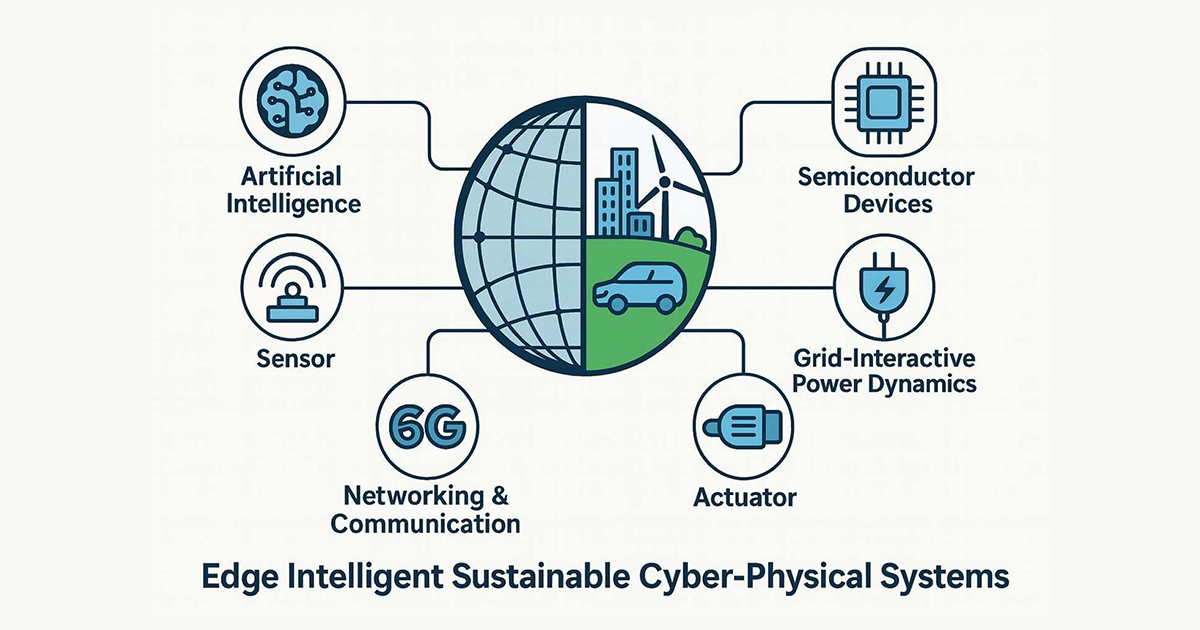Edge-Intelligent Sustainable Cyber-Physical Systems
A special issue of Electronics (ISSN 2079-9292). This special issue belongs to the section "Networks".
Deadline for manuscript submissions: 15 February 2026 | Viewed by 154

Special Issue Editor
Interests: artificial intelligence; machine learning; signal processing; communications; smart grid
Special Issues, Collections and Topics in MDPI journals
Special Issue Information
Dear Colleagues,
We are pleased to announce the Special Issue “Edge-Intelligent Sustainable Cyber-Physical Systems”, which seeks contributions that push the frontiers of edge computing, intelligent perception, advanced electronics, high-performance communications, and energy-aware infrastructure. At the heart of this theme is the recognition that tomorrow’s cyber-physical ecosystems will rely on tightly coupled sensing, learning, communication, and power-management loops carried out in real time at—or near—the network edge. We welcome manuscripts that explore machine-learning techniques for rapid perception and decision support; report breakthroughs in semiconductor and thin-film devices capable of ultra-low-power sensing or on-device inference; describe high-frequency circuits and broadband links that guarantee reliable, low-latency connectivity; and present power-system interfaces able to provide ancillary services such as fast frequency response and virtual inertia. Both theoretical advances and large-scale experimental demonstrations are encouraged, provided they illuminate pathways toward scalable, resilient, and economically viable deployments.
This Special Issue distinguishes itself by emphasizing the integration of these diverse strands rather than treating them in isolation. While prior work has often focused on a single layer—for example, an image-recognition model, a mmWave transceiver, or a grid-support converter—our aim is to showcase studies that reveal how innovations in one domain interact with and magnify progress in the others. By gathering such cross-disciplinary research in one venue, we intend to offer the community a cohesive reference that complements existing topic-specific literature and accelerates the translation of component-level breakthroughs into end-to-end edge-intelligent systems.
Dr. Jun-Pyo Hong
Guest Editor
Manuscript Submission Information
Manuscripts should be submitted online at www.mdpi.com by registering and logging in to this website. Once you are registered, click here to go to the submission form. Manuscripts can be submitted until the deadline. All submissions that pass pre-check are peer-reviewed. Accepted papers will be published continuously in the journal (as soon as accepted) and will be listed together on the special issue website. Research articles, review articles as well as short communications are invited. For planned papers, a title and short abstract (about 100 words) can be sent to the Editorial Office for announcement on this website.
Submitted manuscripts should not have been published previously, nor be under consideration for publication elsewhere (except conference proceedings papers). All manuscripts are thoroughly refereed through a single-blind peer-review process. A guide for authors and other relevant information for submission of manuscripts is available on the Instructions for Authors page. Electronics is an international peer-reviewed open access semimonthly journal published by MDPI.
Please visit the Instructions for Authors page before submitting a manuscript. The Article Processing Charge (APC) for publication in this open access journal is 2400 CHF (Swiss Francs). Submitted papers should be well formatted and use good English. Authors may use MDPI's English editing service prior to publication or during author revisions.
Keywords
- artificial intelligence
- autonomous driving
- semiconductor devices
- thin-film transistor
- 6G communications
- mmWave integrated circuits
- HEMT
- power systems
- cyber-physical systems
- sustainable systems
Benefits of Publishing in a Special Issue
- Ease of navigation: Grouping papers by topic helps scholars navigate broad scope journals more efficiently.
- Greater discoverability: Special Issues support the reach and impact of scientific research. Articles in Special Issues are more discoverable and cited more frequently.
- Expansion of research network: Special Issues facilitate connections among authors, fostering scientific collaborations.
- External promotion: Articles in Special Issues are often promoted through the journal's social media, increasing their visibility.
- Reprint: MDPI Books provides the opportunity to republish successful Special Issues in book format, both online and in print.
Further information on MDPI's Special Issue policies can be found here.





